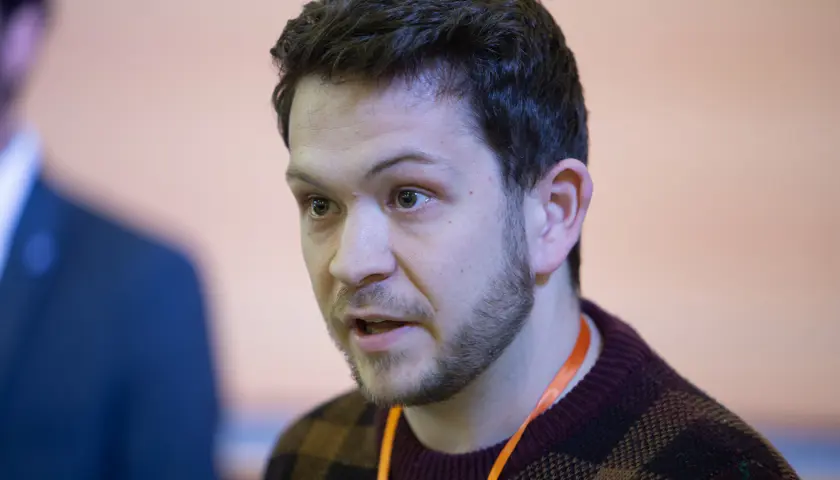
Call to improve support for whistle-blowers
Majority of doctors who took part in survey encountered obstacles when raising concerns
The leader of Scotland’s doctors is calling for urgent action to improve support for whistle-blowers after a study revealed ‘shocking’ experiences of those who raised concerns.
Iain Kennedy (pictured above), council chair of BMA Scotland, said it was ‘frankly shameful’ some doctors felt they couldn’t speak up on behalf of their patients without suffering personal consequences – despite apparent assurances they would be protected.
The vast majority (87 per cent) of doctors who took part in a survey had encountered challenges when trying to raise concerns, and many found themselves blacklisted, marginalised and having their mental state questioned.
One doctor said their health board accused them of making up false complaints and had referred them to the GMC, while another spoke of complainants being ‘interrogated in tears’.
Dr Kennedy, a whistle-blower himself, conducted the study as part of research for an MBA supported by the Universities of Warwick and Aberdeen. Some 436 doctors responded to an online survey of BMA Scotland members to share their experiences.
More than half (51 per cent) had experience of whistle-blowing, most citing patient safety.
Bullying fears
Less than a fifth (17 per cent) were satisfied with their organisation’s response to whistle-blowing.
Fears raised by potential whistleblowers included fear of referral to the GMC (45 per cent), peer disapproval (44 per cent), detrimental career effects (47 per cent), bullying (50 per cent) and disciplinary procedures (51 per cent).
The study found doctors who were older and white were more likely to be whistle-blowers – with one ethnic minority doctor saying that raising concerns was equal to ‘digging the grave’.
Dr Kennedy said: ‘The experiences uncovered by this research – including being bullied, marginalised and even having their mental state questioned – reveal a shocking picture of what can happen to those who do bravely and correctly decide to put their head above the parapet and speak out when things are going wrong.
‘While 94 per cent of those in the survey believe whistle-blowing enhances patient safety and 90 per cent believe it addresses wrongdoing, it is extremely concerning to find only 17 per cent are satisfied with their organisation’s response.
‘It’s frankly shameful that some doctors continue to feel they cannot speak up on behalf of patients without suffering personal consequences – despite all the apparent reassurances to the contrary.
‘We need urgent action to change this and better support to encourage whistle-blowers, particularly for younger and non-white doctors.’
Culture change
He said NHS boards should be supported by the Scottish Government do more to implement whistle-blowing procedures which guarantee anonymity and protection for those speaking up – but said culture change was also needed.
‘Such a change needs to start at the very top and the Scottish Government must focus on fostering a culture, which prioritises patient safety and staff well-being over health boards instead simply trying to do everything they can to manage their reputation.’
Sajid Farid, chair of the BMA Scottish race equality forum said ethnic minority doctors, particularly international medical graduates, are afraid to speak up as they feel that their voices will not be heard.
‘Ethnic minorities lack knowledge of whistleblowing procedures and can have communication challenges. They also experience more “dignity at work” issues. Ethnic minorities are subject to more GMC referrals and often feel that they are not regarded as part of the NHS but rather just used until they are no longer needed.
‘The working environment in the NHS is becoming worse day by day, and the staff shortage is adding to the workplace stress. Whistle-blowers need to have more confidence that their voices will be heard and that they will not face negative consequences. Furthermore, doctors should receive feedback and follow-up on the concerns they have raised.’
Chris Smith, chair of BMA Scotland’s junior doctors committee, said: ‘We’re expected to raise concerns, and this is even mandated by training curricula, but the evidence shows that we feel the reverse is true; whistle-blowing is seen as a threat to progression, not conducive to it.
When junior (soon to be resident) doctors rotate into different departments, we can provide a fresh set of eyes to identify an issue, but we can also too easily be cast as the troublemakers rocking the boat and causing problems where none had been raised before.
‘Doctors need to see positive action being taken when whistle-blowing occurs, which both results in system change and shows that individuals are believed, listened to, and engaged in implementing that change.’
- Until September 2024, resident doctors were referred to as ‘junior doctors’ by the BMA. Articles written prior to this date reflect the terminology then in use



